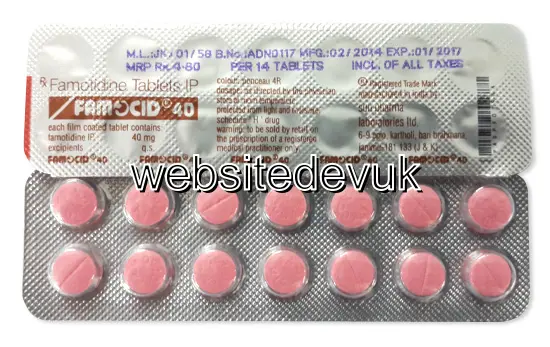| Package | Dosage | Price | Price per Dose | |
|---|---|---|---|---|
| Dosage: 20mg | ||||
| 336 pill | 20mg | £108.43 | £0.32 | |
| 224 pill | 20mg | £91.82 | £0.41 | |
| 168 pill | 20mg | £82.05 | £0.49 | |
| 112 pill | 20mg | £66.42 | £0.60 | |
| 84 pill | 20mg | £53.72 | £0.64 | |
| 56 pill | 20mg | £39.07 | £0.69 | |
| 28 pill | 20mg | £22.46 | £0.79 | |
| Dosage: 40mg | ||||
| 336 pill | 40mg | £125.04 | £0.37 | |
| 224 pill | 40mg | £98.66 | £0.44 | |
| 168 pill | 40mg | £82.05 | £0.49 | |
| 112 pill | 40mg | £63.49 | £0.57 | |
| 84 pill | 40mg | £48.84 | £0.59 | |
| 56 pill | 40mg | £38.09 | £0.67 | |
| 28 pill | 40mg | £20.51 | £0.72 | |

Famotidine Description
Introduction to Famotidine
Famotidine is a widely used medication that belongs to the class of drugs known as H2 receptor antagonists. It is primarily prescribed to reduce the production of stomach acid, making it an effective remedy for various gastrointestinal conditions. Patients often turn to Famotidine to manage symptoms associated with acid reflux, heartburn, and peptic ulcers. Its popularity stems from its proven effectiveness, safety profile, and ease of use.
How Famotidine Works
This medication works by blocking histamine H2 receptors located on the cells lining the stomach. By inhibiting these receptors, Famotidine decreases the secretion of gastric acid. As a result, the stomach produces less acid, which helps relieve symptoms caused by excess acid and promotes the healing of ulcers. The quick action of Famotidine often provides rapid relief from discomfort, making it a preferred option for many patients suffering from acid-related issues.
Uses and Indications
Famotidine is commonly prescribed for conditions including gastroesophageal reflux disease (GERD), Zollinger-Ellison syndrome, and the prevention of stress-induced ulcers in critically ill patients. It may also be used on an as-needed basis for occasional heartburn or acid indigestion. Doctors recommend Famotidine as part of a comprehensive approach to managing chronic gastrointestinal problems, especially when lifestyle modifications alone are insufficient.
Dosage and Administration
The dosage of Famotidine varies depending on the condition being treated and the patient's overall health. Typically, for adults, the medication is taken once or twice a day, either with or without food. It is important to follow the prescribed instructions carefully. Patients should not alter their dosage without consulting their healthcare provider. The medication is usually available in tablet form, but it can also be found as an injectable in certain medical settings.
Potential Benefits and Effectiveness
Many users report significant relief from symptoms after starting Famotidine. Its proven ability to suppress acid production frequently results in ulcer healing and symptom control in a relatively short period. Additionally, Famotidine tends to have fewer side effects compared to older medications. Its safety and tolerability make it suitable for long-term use under medical supervision.
Possible Side Effects and Precautions
Although Famotidine is generally safe, some users may experience side effects such as headache, dizziness, constipation, or diarrhea. Rarely, allergic reactions like rash or swelling may occur. Patients with kidney disease should consult their doctor, as dosage adjustments might be necessary. It is essential to notify a healthcare professional if any adverse reactions occur or if symptoms persist, to ensure proper management.
Conclusion
Famotidine remains a reliable and effective medication for managing various acid-related gastrointestinal conditions. Its ability to quickly reduce stomach acid helps alleviate discomfort and promotes healing. When used as directed, Famotidine offers a good balance of efficacy and safety, making it a popular choice among patients and healthcare providers alike. However, proper consultation and adherence to prescribed dosages are crucial for achieving the best therapeutic outcomes.
